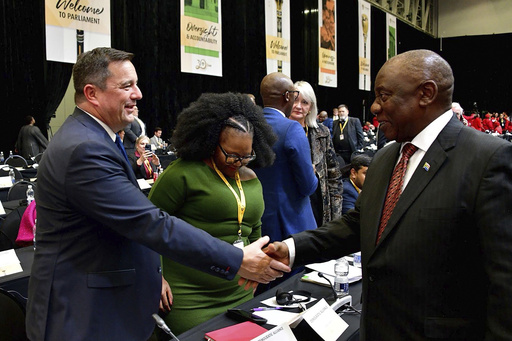
CAPE TOWN, South Africa — The South African government’s yearly budget presentation was unexpectedly canceled on Wednesday and has been rescheduled for next month due to disagreements within the governing coalition. Typically, the finance minister’s budget address occurs in February. The Speaker of Parliament, Thoko Didiza, noted that this is the first time in the history of South Africa’s democracy, which began 31 years ago after the end of apartheid, that the budget presentation has been canceled due to conflicts among coalition parties.
Currently, South Africa operates under a 10-party coalition following the African National Congress (ANC) losing its majority in last year’s election, marking a historic change since apartheid ended. This shift means that the ANC now relies on support from other political parties in Parliament to pass the budget. The Democratic Alliance (DA), the second largest political party in South Africa, stated that the budget delay is linked to the ANC’s proposed 2% value-added tax increase, labeling the move as potentially disastrous for the economy.
The postponement of the budget presentation comes shortly after U.S. President Donald Trump announced the suspension of U.S. aid and assistance to South Africa over a controversial land law. This decision has raised concerns about the pressure it will place on the South African government to secure funding, particularly for the public health sector, which is already feeling the strain from Trump’s recent freeze on U.S. aid globally.
The South African economy, considered the most advanced in Africa, has struggled to grow in recent years. Finance Minister Enoch Godongwana expressed that the government is grappling with various fiscal challenges. He raised critical questions about the potential need for borrowing more funds, the implications of continued expenditure cuts, and the effects of proposed tax increases. Godongwana emphasized a collective understanding that new methods are necessary to fund the government’s current priorities.
The Umkhonto we Sizwe Party, which is part of the opposition, criticized the government for failing to present a budget, suggesting it demonstrates a lack of leadership. Recent disputes between the ANC and the DA have also emerged regarding the Land Expropriation Act, which enables the government to take private land for public use. Additionally, tensions have risen over an education bill that seeks to give the government more authority over schools serving the white minority population.
The Black Business Council, an organization focused on promoting the participation of Black-owned businesses in the economy, has warned that the delay in the budget could lead to uncertainty for investors. The council’s CEO, Kganki Matabane, expressed concern, stating that while efforts are being made to address the fallout from the Trump situation, such inconsistencies in governance could undermine South Africa’s reputation and the government’s credibility.

